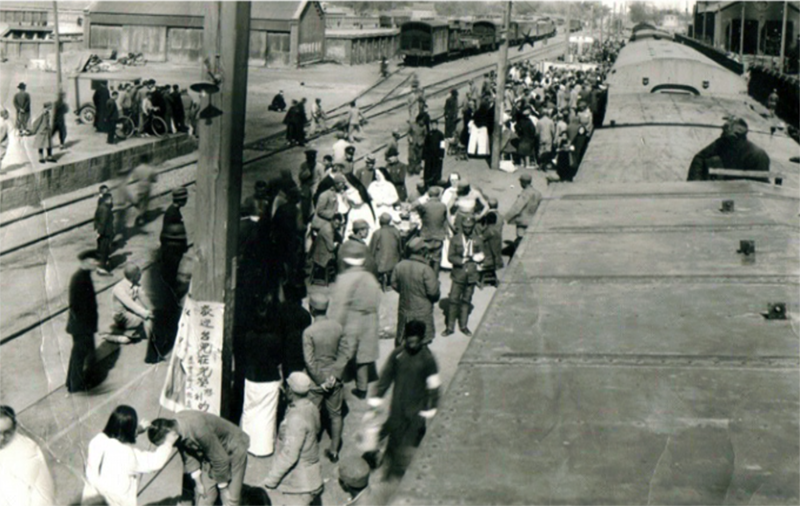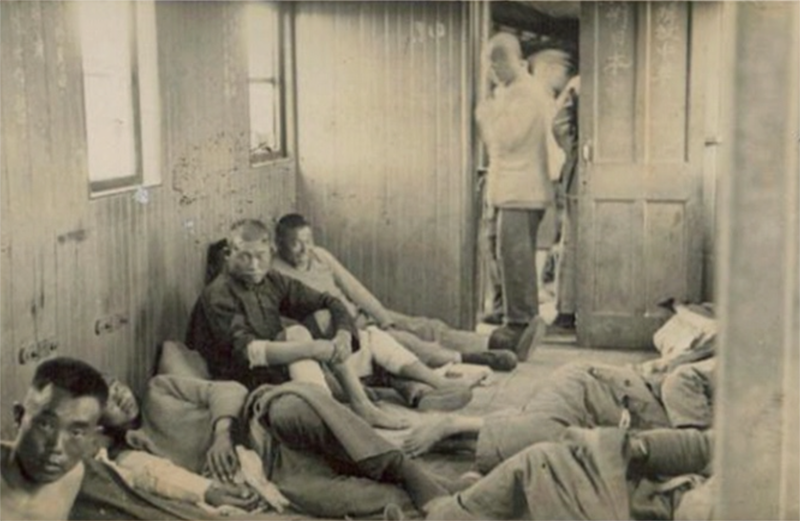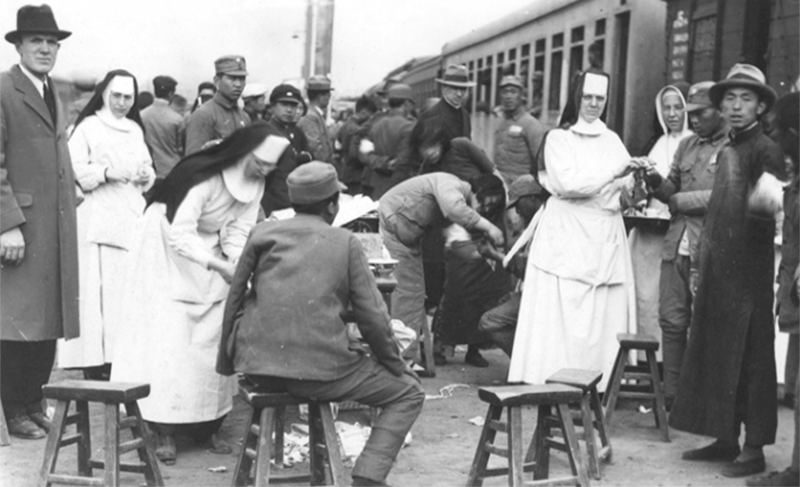

After incidents and then more incidents in the relationship between China and Japan, there finally dawned that historic triple-seven--the seventh of July 1937. That day there was to occur the incident at Marco Polo Bridge near Peiping which brought an end to pretense, at least as far as China was concerned, and China and Japan were at war at last. At first the war was something still distant from us in Kaifeng. I don't mean that we were not intensely interested and concerned with every day's news, that we were not horror-stricken with the course of events in Shanghai, that we were not revolted at stories of the atrocities of war. But we were not yet seeing or feeling firsthand the results of this war. Then came the fall of Nanking; and with a jolt the missionaries of Kaifeng were awakened to a consideration of what must and could be done.
In November (1937) Protestant missionaries in Nanking saw the fall of the city and the horrors which followed this fall when soldiers were turned loose by their officers to loot and rape and murder at will. These missionaries felt that the atrocities of Nanking could be avoided in other cities if the missionaries were prepared. They therefore
composed a letter to their confreres in other parts of China, and Chinese messengers were sent through the Japanese lines with copies of this document hidden in their clothing or sewn into their home-made Chinese shoes. And so we were to be given a closer understanding of the meaning of war. The result of the arrival of these letters in Kaifeng was the formation of the International Relief Committee in January 1938. It was made up of Protestant and Catholic missionaries. At their first meeting Father Francis Clougherty was chosen chairman. The working group which this committee headed consisted of people of various nationalities, of doctors and nurses, of teachers and other mission workers.. .
The evening of April 2, 1938, seeing off friends, a couple of missionaries from the China Inland Mission Hospital--the only mission hospital for Kaifeng, and this outside the city walls--noticed a train loaded with wounded from the fighting around Hsuchow pull into the station. The destination of this train was west to Chengchow and then south to Hankow where military hospitals were located.  They saw the doctors working desperately to relieve some of the suffering of these men who had already been en route twenty-four hours and who might not reach a hospital for another twenty-four to forty-eight hours depending on the movement
They saw the doctors working desperately to relieve some of the suffering of these men who had already been en route twenty-four hours and who might not reach a hospital for another twenty-four to forty-eight hours depending on the movement
of supply trains, in the opposite direction, to the front. The missionaries approached the doctors and asked whether they could be of help. Their offer was gratefully accepted and they hurried back to the hospital for doctors, nurses, and supplies.
Missionaries were organized into groups under the direction of medical personnel. Supplies of bandages, splints, ointments, pain relievers and other necessities were secured by the committee and passed out to the workers. A man was constantly kept at the railroad station and as soon as a train of wounded passed through the station nearest Kaifeng he telephoned key mission positions. Before the train reached Kaifeng we were at the station waiting. It was during these days and nights of working side by side that Protestant and Catholic missionaries came to know and to admire each other. One train load and it became apparent what other help these men needed. They needed food for one thing, and so each train was met with steaming buckets of hot porridge made of rice or millet. Hot water was on hand, and the missions who had cows brought milk. Some of these men were lying in box cars with nothing between them and the hard floor. After that straw was always on hand for any who needed it. Others needed clothing and the Red Cross supplied a simple jacket and pants for any man who was without.
One train load and it became apparent what other help these men needed. They needed food for one thing, and so each train was met with steaming buckets of hot porridge made of rice or millet. Hot water was on hand, and the missions who had cows brought milk. Some of these men were lying in box cars with nothing between them and the hard floor. After that straw was always on hand for any who needed it. Others needed clothing and the Red Cross supplied a simple jacket and pants for any man who was without.
Sometimes men died en route. For these the committee secured simple wooden coffins and took care of the burial. It also became apparent that others would never reach Hankow. On pressure from the committee, the Chinese Red Cross opened a hospital in Kaifeng and men whose chances seemed slim were taken off the trains and transferred to this hospital. Many men recovered who otherwise would have had no chance to reach Hankow alive. Others died and were buried by the committee. Many of the men who died did so with their souls fresh from the waters of baptism.
Week after week this work continued. At first the trains came in any time during the day or night and we were on twenty-four-hour call. As the danger of bombing became greater trains came in only at night. We no longer needed to be called; we just naturally showed up at the station each evening. We knew there would be at least one train of about eight hundred wounded; sometimes there were three. Everybody worked until four A.M., for then the trains had to move on if they didn't want to be caught by the bombers.  Going home at that hour, we would first have holy mass; then, eat breakfast and go to bed. Soon the bombers were coming.almost every day, weather permitting. The station became a pile of rubble, the platform on which we worked was full of deep holes, the roof of the platform was gone. The committee put up mat sheds as shelters and supplied storm lanterns instead of the destroyed electric lights.
Going home at that hour, we would first have holy mass; then, eat breakfast and go to bed. Soon the bombers were coming.almost every day, weather permitting. The station became a pile of rubble, the platform on which we worked was full of deep holes, the roof of the platform was gone. The committee put up mat sheds as shelters and supplied storm lanterns instead of the destroyed electric lights.